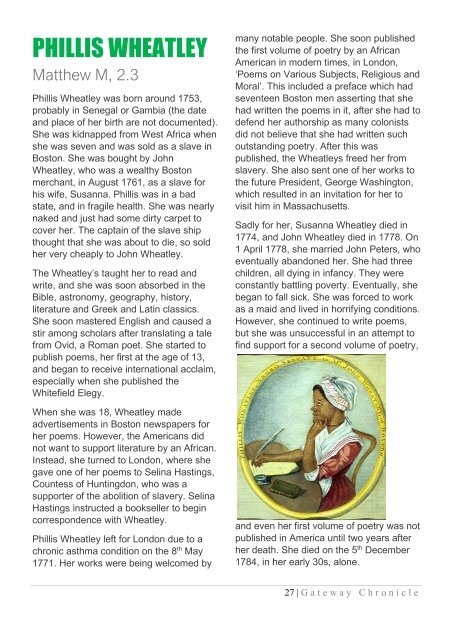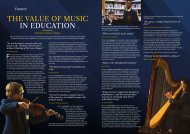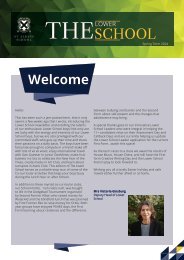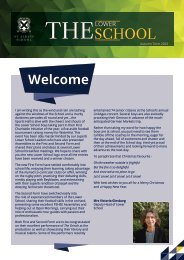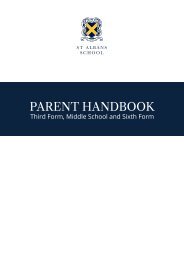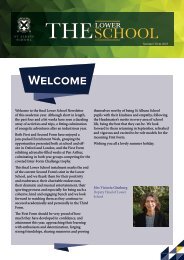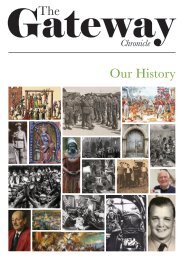Gateway Chronicle 2022
You also want an ePaper? Increase the reach of your titles
YUMPU automatically turns print PDFs into web optimized ePapers that Google loves.
PHILLIS WHEATLEY<br />
Matthew M, 2.3<br />
Phillis Wheatley was born around 1753,<br />
probably in Senegal or Gambia (the date<br />
and place of her birth are not documented).<br />
She was kidnapped from West Africa when<br />
she was seven and was sold as a slave in<br />
Boston. She was bought by John<br />
Wheatley, who was a wealthy Boston<br />
merchant, in August 1761, as a slave for<br />
his wife, Susanna. Phillis was in a bad<br />
state, and in fragile health. She was nearly<br />
naked and just had some dirty carpet to<br />
cover her. The captain of the slave ship<br />
thought that she was about to die, so sold<br />
her very cheaply to John Wheatley.<br />
The Wheatley’s taught her to read and<br />
write, and she was soon absorbed in the<br />
Bible, astronomy, geography, history,<br />
literature and Greek and Latin classics.<br />
She soon mastered English and caused a<br />
stir among scholars after translating a tale<br />
from Ovid, a Roman poet. She started to<br />
publish poems, her first at the age of 13,<br />
and began to receive international acclaim,<br />
especially when she published the<br />
Whitefield Elegy.<br />
When she was 18, Wheatley made<br />
advertisements in Boston newspapers for<br />
her poems. However, the Americans did<br />
not want to support literature by an African.<br />
Instead, she turned to London, where she<br />
gave one of her poems to Selina Hastings,<br />
Countess of Huntingdon, who was a<br />
supporter of the abolition of slavery. Selina<br />
Hastings instructed a bookseller to begin<br />
correspondence with Wheatley.<br />
Phillis Wheatley left for London due to a<br />
chronic asthma condition on the 8 th May<br />
1771. Her works were being welcomed by<br />
many notable people. She soon published<br />
the first volume of poetry by an African<br />
American in modern times, in London,<br />
‘Poems on Various Subjects, Religious and<br />
Moral’. This included a preface which had<br />
seventeen Boston men asserting that she<br />
had written the poems in it, after she had to<br />
defend her authorship as many colonists<br />
did not believe that she had written such<br />
outstanding poetry. After this was<br />
published, the Wheatleys freed her from<br />
slavery. She also sent one of her works to<br />
the future President, George Washington,<br />
which resulted in an invitation for her to<br />
visit him in Massachusetts.<br />
Sadly for her, Susanna Wheatley died in<br />
1774, and John Wheatley died in 1778. On<br />
1 April 1778, she married John Peters, who<br />
eventually abandoned her. She had three<br />
children, all dying in infancy. They were<br />
constantly battling poverty. Eventually, she<br />
began to fall sick. She was forced to work<br />
as a maid and lived in horrifying conditions.<br />
However, she continued to write poems,<br />
but she was unsuccessful in an attempt to<br />
find support for a second volume of poetry,<br />
and even her first volume of poetry was not<br />
published in America until two years after<br />
her death. She died on the 5 th December<br />
1784, in her early 30s, alone.<br />
27 | G ateway <strong>Chronicle</strong>


